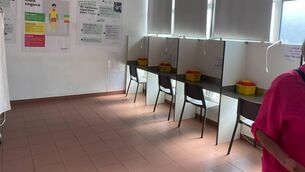Alcohol industry in fight for bottom line
“As a society, we must understand, accept and deal with the negative consequences that arise from our use and misuse of alcohol,” he wrote.
Later the report highlights that:
* Alcohol was responsible for at least 88 deaths every month in 2008;
* It is a contributory factor in half of all suicides;
* Is a factor in deliberate self-harm;
* Increases the risk of more than 60 medical conditions and is associated with 2,000 beds being occupied every night in Irish acute hospitals, one-quarter of injuries presenting to emergency departments, and over half of attendances to specialised addiction treatment centres.
Clearly then, it was important that those appointed to the steering group be singing from the same hymn-sheet — ridding society of the excesses which have blighted so many lives in this country.
However, documents released to the Irish Examiner following a Freedom ofInformation request show that from the start, elements of the group had a very different focus to many of their colleagues.
The first meeting of the members was barely over in December 2009 when Dr Holohan received a letter from Alcohol Beverage Federation of Ireland(ABFI) director Rosemary Garth, who said her organisation objected to the group’s terms of reference because they referred to “harm caused by alcohol” and not “harm caused by alcohol misuse”.
“I understand that one member of the group compared the use of alcohol to the use of heroin,” she said. “We believe this is a serious situation that must be urgently addressed. Unless the working group examines what it has been charged to do — substance misuse — it poses a serious threat to the viability of the strategy.”
It was not exactly an auspicious start. And despite Dr Holohan thanking the members of the steering group in his foreword for their “commitment to the recommendations as set out in the report”, the simple fact is that the alcohol industry’s issues with the steering group’s work continued.
ABFI, first and foremost, represents companies that are trying to profit from the sale of alcohol. Its members would not thank it for being a willing participant in process which would undermine their bottom line.
In a letter to newly appointed drugs strategy minister Pat Carey in May 2010, Ms Garth made that very clear.
“We are concerned that the direction the group is taking is towards measures to reduce alcohol consumption in general rather than targeted efforts aimed at those who misuse alcohol,” she said.
Throughout the ensuing months, ABFI, along with the alcohol-industry-sponsored Mature Enjoyment of Alcohol in Society (MEAS), was keen to stress the benefits of alcohol in moderation — and were very vocal when that was not given prominent billing. Following the release of one draft, ABFI insisted the benefits be a “standalone point with a bolded headline, ie ‘alcohol decreases the risk of certain conditions’. As it is written here it is buried within a headline that is misleading”.
Huge swathes of draft reports were “unacceptable” to ABFI.
It tried to block the inclusion of a table on “cost of harmful use of alcohol in Ireland” because it said the data was unpublished — “We don’t believe it should be included if it has not been peer reviewed,” it said.
Eventually, when it seemed the document was about to be made public and it was clear that many of ABFI’s concerns would not be addressed, the new director of ABFI, Kathryn D’Arcy, wrote to Dr Holohan demanding that her organisation had a “fundamental right” to have a minority report included in the final report “to record our views on the process and the recommendations”.
“(We) will not agree to sign off on the final report until we get an opportunity to have our minority report included,” she said.
A review of that “minority report” simply confirms the view that ABFI was very much on the margins by the time it was finally completed. For 15 pages it picked holes in the draft report with a huge number of the points clearly motivated by its bottom line — the profits of the drinks industry. In the end, the minority report was not included in the final document.
In the unpublished document, ABFI not surprisingly rejects, among a myriad of other things, a call for an industry-sponsored “social responsibility levy”, increasing excise duties, minimum pricing for alcohol (though supported a ban on below cost selling), a 9pm watershed on alcohol advertising and a reduction on recommended daily intake.
For its part, MEAS also had its issues with the steering group, of which it was also a member.
It described as “gratuitously offensive” a section in the September 2011 draft of the report which said: “The majority of the steering group are concerned about the independence of MEAS being an organisation funded by the alcohol industry and promoting responsible drinking”. MEAS chief executive told Dr Holohan that, on the basis of that statement, “it is difficult not to conclude that the steering group’s findings are being driven by a prejudice rather than evidence”.













